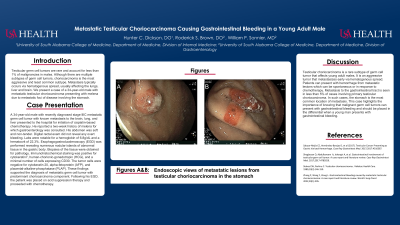Back


Poster Session C - Monday Afternoon
Category: GI Bleeding
C0354 - Metastatic Testicular Choriocarcinoma Causing Gastrointestinal Bleeding in a Young Adult Male
Monday, October 24, 2022
3:00 PM – 5:00 PM ET
Location: Crown Ballroom

Has Audio

Hunter C. Dickson, DO
USA Health
Mobile, AL
Presenting Author(s)
Hunter C. Dickson, DO1, Roderick S. Brown, DO2, William P. Sonnier, MD2
1USA Health, Mobile, AL; 2University of South Alabama College of Medicine, Mobile, AL
Introduction: Testicular germ cell tumors are rare and account for less than 1% of malignancies in males. Although there are multiple subtypes of germ cell tumors, choriocarcinoma is the most aggressive and least common subtype. Metastasis typically occurs via hematogenous spread, usually affecting the lungs, liver and brain. We present a case of a 34-year-old male with metastatic testicular choriocarcinoma presenting with melena due to metastatic foci of disease involving the stomach.
Case Description/Methods: A 34-year-old male with recently diagnosed stage IIIC metastatic germ cell tumor with known metastasis to the brain, lung, and liver presented to the hospital for initiation of cisplatin-based chemotherapy. He reported a two-week history of melena for which gastroenterology was consulted. His abdomen was soft and non-tender. Digital rectal exam did not reveal any overt bleeding. Labs were notable for a hemoglobin of 6.8g/dL and a hematocrit of 22.3%. Esophagogastroduodenoscopy was performed revealing numerous nodular islands of abnormal tissue in the gastric body. Biopsies of the tissue were obtained and sent to pathology. Biopsies of the mucosa were positive for cytokeratin7, human-chorionic-gonadotropin (HCG), and a minimal number of cells expressing CD30. The tumor cells were negative for cytokeratin 20, alpha-fetoprotein (AFP), and placental-alkaline-phosphatase (PLAP) on immunohistochemistry staining. These findings supported the diagnosis of metastatic germ cell tumor with predominant choriocarcinoma component. Following esophagogastroduodenoscopy, the patient was placed on acid suppression therapy and proceeded with chemotherapy.
Discussion: Testicular choriocarcinoma is a rare subtype of germ cell tumor that affects young adult males. It is an aggressive tumor that metastasizes early via hematogenous spread. Patients can present with hemorrhage from metastatic lesions which can be spontaneous or in response to chemotherapy. Metastasis to the gastrointestinal tract is seen in less than 5% of cases involving primary testicular choriocarcinoma. In such cases, the stomach is the most common location of metastasis. This case highlights the importance of knowing that malignant germ cell tumors can present with gastrointestinal bleeding and should be placed in the differential when a young man presents with gastrointestinal bleeding.
Disclosures:
Hunter C. Dickson, DO1, Roderick S. Brown, DO2, William P. Sonnier, MD2. C0354 - Metastatic Testicular Choriocarcinoma Causing Gastrointestinal Bleeding in a Young Adult Male, ACG 2022 Annual Scientific Meeting Abstracts. Charlotte, NC: American College of Gastroenterology.
1USA Health, Mobile, AL; 2University of South Alabama College of Medicine, Mobile, AL
Introduction: Testicular germ cell tumors are rare and account for less than 1% of malignancies in males. Although there are multiple subtypes of germ cell tumors, choriocarcinoma is the most aggressive and least common subtype. Metastasis typically occurs via hematogenous spread, usually affecting the lungs, liver and brain. We present a case of a 34-year-old male with metastatic testicular choriocarcinoma presenting with melena due to metastatic foci of disease involving the stomach.
Case Description/Methods: A 34-year-old male with recently diagnosed stage IIIC metastatic germ cell tumor with known metastasis to the brain, lung, and liver presented to the hospital for initiation of cisplatin-based chemotherapy. He reported a two-week history of melena for which gastroenterology was consulted. His abdomen was soft and non-tender. Digital rectal exam did not reveal any overt bleeding. Labs were notable for a hemoglobin of 6.8g/dL and a hematocrit of 22.3%. Esophagogastroduodenoscopy was performed revealing numerous nodular islands of abnormal tissue in the gastric body. Biopsies of the tissue were obtained and sent to pathology. Biopsies of the mucosa were positive for cytokeratin7, human-chorionic-gonadotropin (HCG), and a minimal number of cells expressing CD30. The tumor cells were negative for cytokeratin 20, alpha-fetoprotein (AFP), and placental-alkaline-phosphatase (PLAP) on immunohistochemistry staining. These findings supported the diagnosis of metastatic germ cell tumor with predominant choriocarcinoma component. Following esophagogastroduodenoscopy, the patient was placed on acid suppression therapy and proceeded with chemotherapy.
Discussion: Testicular choriocarcinoma is a rare subtype of germ cell tumor that affects young adult males. It is an aggressive tumor that metastasizes early via hematogenous spread. Patients can present with hemorrhage from metastatic lesions which can be spontaneous or in response to chemotherapy. Metastasis to the gastrointestinal tract is seen in less than 5% of cases involving primary testicular choriocarcinoma. In such cases, the stomach is the most common location of metastasis. This case highlights the importance of knowing that malignant germ cell tumors can present with gastrointestinal bleeding and should be placed in the differential when a young man presents with gastrointestinal bleeding.
Disclosures:
Hunter Dickson indicated no relevant financial relationships.
Roderick Brown indicated no relevant financial relationships.
William Sonnier: Abbvie – Speakers Bureau.
Hunter C. Dickson, DO1, Roderick S. Brown, DO2, William P. Sonnier, MD2. C0354 - Metastatic Testicular Choriocarcinoma Causing Gastrointestinal Bleeding in a Young Adult Male, ACG 2022 Annual Scientific Meeting Abstracts. Charlotte, NC: American College of Gastroenterology.

